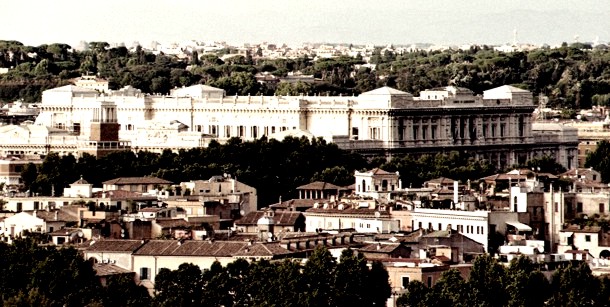Posted by brmull

[Above: the Supreme Court of Italy seen from the south-east across the River Tiber]
The Chief Prosecutor and Deputy Chief Prosecutor of Umbria base their formidable appeal on ten points repeated here from ZiaK’s excellent translation below.
The reasons for the appeal to Cassation which Perugia’s General Prosecution presented today against the acquittal verdict of Amanda and Raffaele are based on ten points of the second-level verdict.1. I agree that the appointing of the independent experts was unjustified, because they were essentially just another opinion, a sort of tie-breaker, applying 2011 standards to 2007 evidence, who were revealed to have pre-existing biases about the questions posed to them.
The first is the lack of grounds for the decision, in the decree of 18 December 2010, to allow the forensic testimony/expert witness in the appeal judgement.
The second, in contrast, concerns a contrary decision: the decision to not allow a new forensic investigation requested by the prosecution at the end of the ruling discussion. In the appeal to Cassation it is written that the Appeal Court’s rejection reveals “contradictoriness/contrariness and demonstrates manifest illogicality in the grounds for the judgement/reasoning report”.
The other points deal with the decision by the Appeal court of Assizes of Perugia to not hear the witness Aviello, also the definition of “unreliable” [in the Hellman Report] with reference to the witnesses Roberto Quintavalle and and Antonio Curatolo, also the time of death of Meredith Kercher, also on the genetic investigations.
As well as the analyses of the prints and other traces, also the presence of Amanda and Sollecito in via della Pergola, also the simulation of a crime [the staged break-in], and also the exclusion of the aggravating circumstance of the crime of “calumny”.
Independent experts should be a piece of evidence, not a final arbiter. I know the Kerchers opposed the appointment of these experts (I don’t know about the prosecution) so clearly they weren’t a consensus choice, as is preferred whenever independent experts are employed.
2. I agree that if Conti and Vecchiotti were allowed to judge the scientific police by 2011 standards, then the court should have allowed testing using highly sensitive 2011 technology. Furthermore Dr. Stefanoni was left to defend her work against the academic experts, without any back-up from Dr. Novelli who is more than a match for the independent experts in terms of credentials.
3. I’m on the fence as to whether the court should have recalled Aviello to discuss why he had recanted his testimony. I don’t know what the legal procedure is when a witness recants while the trial is still underway.
4. I strongly agree that the decision to recall the man in the park, Curatolo, and then determining that the old man’s memory was unreliable four years after the fact, was completely inappropriate. Curatolo’s testimony at the first trial was more than adequate. Nothing was learned from this exercise except that his memory has become worse with time (whose hasn’t?) and that he subsequently got in trouble with the law, which is overly prejudicial.
5. If the court insisted on recalling Curatolo to try to assess his reliability, they should have done the same for the store owner Quintavalle. Instead he was deemed unreliable based on a cherry-picked selection from his 2009 testimony.
6. On the time of death, I’m one of those who believe Hellmann got it right, but it has no bearing on the defendants’ guilt or innocence, since they have no alibi for either time. I look forward to the prosecution’s argument on this.
7. I agree that Hellmann’s decision to accept the defense explanation for the footprints was arbitrary and not justified by his motivations report.
8. The luminol traces in Filomena’s room were improperly determined to be footprints. They were then lumped in with the footprints in the hall without any separate attempt at explanation.
9. I agree that the Court’s determination that the defendents would not lie about being at the cottage, simply because they were “good kids” is outrageous. (In the U.S. you can’t use character evidence to decide innocence or guilt, and doing so would mean a mistrial. I’m not sure about the situation in Italy.)
10. I agree Hellmann’s explanation for the simulation of a crime was a sham, in which he accepted all of the defense arguments and showed no curiosity at all about whether this scenario could actually happen.
The court had clearly made up its mind about the case already and decided to just shove the staged break-in, a crucial part of the case, under the rug.
***
*The prosecution also wants to add “aggravating factors” to the charge of calumny. This is a freebie. I don’t know if it will have any bearing on the appeal.
**The fact that Hellmann seems to have applied the “reasonable doubt” standard to individual pieces of evidence, when this should only apply to the case as a whole, seems like a huge basis for appeal.
I’m glad to see the prosecution bringing this up.
Posted by brmull on 02/15/12 at 07:47 AM in
http://truejustice.org/ee/index.php?/tjmk/comments/weighing_the_ten_points_on_which_the_umbria/
http://truejustice.org/ee/index.php?/tjmk/comments/weighing_the_ten_points_on_which_the_umbria/
